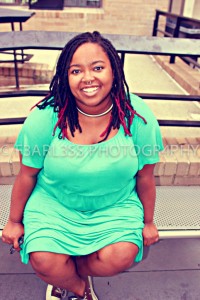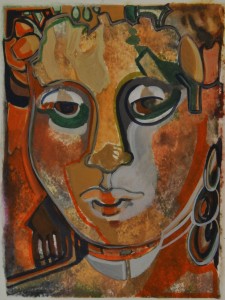Anais: I’ve known you as a poet, have seen you perform and really enjoyed it so I could really see your connection to poetry in “The Light Keeper.” I’m interested to know more about your transition from poetry to prose. The poetry writing process is clearly so different from the prose writing process especially when you are thinking about moving into writing a novel. What has that process been like for you?
Ashley: I started off writing poetry and I was reaching really far into that form to try to tell these big stories. My last poetry workshop, Voices of Our Nations Arts Foundation, a workshop for writers of color in San Francisco, my teacher (Willie Perdomo) looked over my manuscript and said, “Man, you need to write prose. This is a story. You need to tell it. This form doesn’t work for you anymore.” That’s when I moved past poetry and I felt it was a mature move for me as a writer. So I have just been writing for the past two years, mostly personal stories about my sexuality, my relationships, of finding love and self-love. Now taking all this writing and putting it into a structure has been a big learning curve because I was so used to the fast-paced world of poetry. It came so easily and it was in a compact form. I wrote one poem and I went on to the next. Writing a novel has been a much slower process. But spending a lot of time on one piece has taught me a lot of patience.
Anais: So going off the idea of the emotion in the piece and so many layers that evoke poetry, yet there is this huge story and huge characters. I can’t quit conceptualize how it feels like there are such huge, real, complex characters while at the same time knowing so little about them. There are so few words and I feel like I just briefly met Giovanni and don’t really know much about him but felt him and took him in and got a huge part of his story but there is still so much there, so much to know. I think what I’m trying to ask is how did this piece come about?
Ashley: I write about the process of writing this piece in the book and then the piece is in the book. It was a very intentional exercise – I was in a writing workshop for a week with the Lambda Literary Foundation and the last workshop we did, we were paired with someone in the class and instructed to ask each other questions from the themes we write from. I had a manuscript coming into the workshop that was about my mother, dealing with her mental illness and being in family therapy that failed miserably. So my instructor paired me with Giovanni because he had such a fantastic story about his mother. It was a really intense process to write that piece because he did give me so little like you said, but I tapped into something I had not tapped into before in my writing. Right after I wrote this piece I had a panic attack and in the book, I write out having a panic attack. I’m learning that I want to write out recovery, what it looks like to feel that intense re-birth pain and come out shining and finding some inner light on the other side.
Anais: The idea in this story, the violence that Giovanni experiences, it would be so easy to portray him as a victim and to take away his agency and for the reader to pity him. These are all things that happen when we talk about stories of violence, especially when it comes to people of color and queer identified folks. There is so much victimization in those discourses. You want to raise awareness that this happens but what’s the result? Are we creating victims or people who become objects of pity? But I love how even in his mother’s words, you put it in there: “It would be hard, but he would be okay.” So acknowledging the pain and the trauma and the struggle is good, but at the same time showing that he’s going to be okay without necessarily having to tell us more. I have been thinking about the danger of a single narrative and I love how in resisting that dominant story, you’re not creating another dominant story. I think that’s powerful, how you do that.
Ashley: I really like the connection you are making between the victim mentalities and being a POC (person of color). The Giovanni I met was not your standard victim. He wasn’t pitiful, he was actually fantastically full of life and you could see the scars that were still there. I think as brown folks we learn how to just keep it moving, like shit comes at you, you just got to keep it moving. I think everyone goes through that but particularly as a person of color. I think something that was so interesting about Giovanni’s situation is the inner dynamics that happen within brown communities – the ideas of privilege and the jealousy and the hate and all of the inner violence that we actually experience as a brown community. That’s something I talk about in the book, being a brown girl in communities where I am the only brown girl and where the other brown girls around me are feeling as anxious and upset and unheard as I am so how do we support and guide each other without re-enacting violence? I think as far as being a victim of something it is really about how you own it, continuing to experience your feelings and thoughts about it but creating something that can come out better on the other side and that was totally what I saw in Giovanni.
Anais: At one point in The Light Keeper, you go into Giovanni’s speculation and reasoning as to why the boys he grew up with, other brown boys beat him and you say “he can tell when his book reviewers are white because they don’t understand his reasoning.” When I read that, I was seeing it on multiple levels. I was seeing it in terms of his story and the white reviewers of his writing but I was also thinking of it as a message to the white reviewers of your writing. Reading your writing about his story is definitely sending a message about your book to white readers and it makes me question the audience of your novel.
Ashley: I think the narratives that I want to write (around race understanding) are that sometimes you are just not going to get it. My experience is different from your experience, I am disenfranchised because of the color of my skin and white folks have privilege. It’s engrained in our culture systematically. Our experiences are just different and it’s okay if you don’t understand. My message to white readers is that just because you don’t understand, doesn’t mean you aren’t responsible for still having a level of listening and thinking, checking yourself and checking your privilege and learning that there are bigger dynamics in communities of color then you may know. I want people to pick up my book and start asking those questions, regardless of what color they are. We can’t stop talking about race because it affects all of us. I think as far as audience, I write for brown girls, for queer folks, for people who identify differently, but I definitely want to create a window into this very special world that I feel like I have been privileged to be a part of, a world where I can discover my sexuality, discover love and learn how my social world works for me.
Anais: I know a larger part of your novel takes place here in the Pioneer Valley, so you can imagine some of what I am doing and experiencing. I’m interested to hear more about your own experiences in that and how that informs what you are doing in your novel.
Ashley: The story is about meeting my partner in the Pioneer Valley. She is also a Black girl, and we came to each other as complete and utter wrecks–for various reasons but a lot of the same reasons, like feeling isolated in academia, being very intelligent but always feeling like an encyclopedia for people who want to understand the people-of-color experience. We were going through a lot of the same stuff and responding really differently to it but we some how managed to come together, oddly enough through a student production of the musical Hair! The struggles for me at Hampshire College were learning about queer identity, learning a lot about myself, having access to ideas I had never heard of, and knowing that I have the privilege to do that. But I also felt isolated in a lot of my classes that talked about multiculturalism while excluding other cultures and not analyzing problematic readings. So I jet-setted off to South Africa with a school group and experienced all the same racial violence within the group of girls that I traveled with. So there is actually a lot of violence that appears in the book in these ways but the key to the story is how these characters navigate their way through it, fall apart into polyamory and come back together in marriage. I definitely think the way we experienced isolation in the Valley creates a lot of who we are now and who we say we want to be for each other in our relationship.
Anais: Thanks so much for the discussion, Ashley. I appreciate it.
Anais N. Surkin is a radical genderqueer organizer, activist, educator, advocate and scholar whose dedication to resisting all forms of oppression and violence is central to their struggle for liberation and global vision of transformative social and economic justice. They are a doctoral student in Social Justice Education at UMass Amherst, and facilitator of Intergroup Dialogue. Prior to coming to Massachusetts, they worked as coordinator of LGBTQ Services at a Victims Services Agency/Rape Crisis Center in New York around issues of intimate partner violence, sexual violence, hate violence and criminalization as they affect intersecting LGBTQ, sex worker and immigrant communities.



Pingback: The Light Keeper (For Sonya) | Rkvry Quarterly Literary Journal
Pingback: Writerly Updates: Articles and Event Highlights | Indigo's Theory
Pingback: The Light Keeper (For Sonya) | Rkvry Quarterly Literary Journal